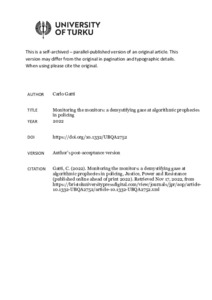Monitoring the monitors: a demystifying gaze at algorithmic prophecies in policing
Gatti Carlo
https://urn.fi/URN:NBN:fi-fe2022112967621
Tiivistelmä
Predictive policing lies at the intersection of a diachronic paradox between the innovativeness of algorithmic prediction and its selective application to archetypes of conventional criminology. Centring on the Italian context, I outline a critique of predictive policing, proceeding from its embeddedness in the neoliberal restructuring of security provision and the increasingly blurred boundaries between private and public agencies. Rejecting the narrative of technical neutrality and operational smartness, I retrace the interdependence of a selective understanding of security that has paved the way for predictive policing and the impact of automated predictions on the governance of crime control. I argue that the production of social harm under predictive policing follows three main patterns: firstly, the continuation of a tolerable rate of street crime; secondly, a dramatic acceleration in the marginalising and stigmatising potential of criminal targeting; and thirdly, the impairment of democratic accountability through tautological schemes of self-legitimation.
Kokoelmat
- Rinnakkaistallenteet [29337]
